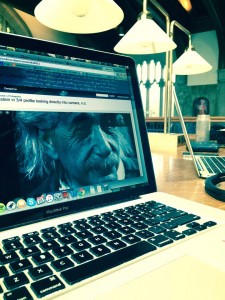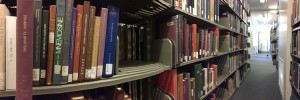“To a collector, you see, the true freedom of all books is somewhere on his shelves.” – Walter Benjamin from ‘Unpacking My Library‘
“What can a library do with secret letters? We shall define libraries in general as places devoted to keeping the secret but insofar as they give it away. Giving a secret away may mean telling it, revealing… as well as keeping it so deeply in the crypt of memory that we forget it is there or even cease to understand and have access to it. In one sense a secret kept is always a secret lost.” – Jacques Derrida from Geneses, Genealogies, Genres and Genius
“Dear Posterity!
If you don’t become fairer, more peaceful, and generally more reasonable than we are, or have been, then the devil take you.
Having thus uttered this pious hope in all due respect, I am your (former)
sig. Albert Einstein” – Princeton, May 4, 1936 from Vassar’s Einstein Digital Collection

The world seems over-populated with geniuses. I’m not trying to be cheeky (or, that is, I’m only trying a little), but, working with Professor Andy Bush these past few months to plan a Jewish Studies course for the Fall, my life has been teeming with the lot of them and I’m only saying what I see.
What have I been doing to be so graced with the presence of great men and women? I know that I’ve been reading, copiously, feverishly, that I’ve been sitting in various positions in varying stages of madness (but always with a cup of coffee in hand) in the library or the Krafted Cup trying to discern what is it that makes something collectable. To put something in an archive, Walter Benjamin seemed to be telling me (fairly shouting at me via tome and photocopied essay), you must be in love with it. What else? Only an object of passion may gain access to the portraiture that is your private collection. A true collector, Edward Fuchs of Benjamin’s famed essay for instance, collects only that which manifests his absolute devotion: materials that he must collect and that are, in fact, not only very material, but also that have been forgotten or have ‘died’ somehow in the course of their existence. This took me off on a long ahistorical journey of materialism and poetry, which ended, as it began, with Einstein. Or rather, what remains of his ‘genius.’ Let me explain.
Among our great collectors we might place Otto Nathan, former Vassar professor. And the object of his devotion? His companion and correspondent Albert Einstein, of course. Nathan collected the debris of forty years of friendship and aid: letters from Einstein, from Elsa, Einstein’s wife, postcards, photographs, and ephemera because, it is not too difficult for one to make the assumption, he loved Einstein dearly.
But, Einstein himself seems not to be a collectible material (if amalgamations of public memory might ever said to be materials) because there’s a distinct way in which he has not yet died – not yet garnered the potential energy of the marginalized that allows a collector the capacity to save him from obscurity. He is a constant ghost, or perhaps, not he himself but his vestigial consumable discoveries and the inevitably false phantom of his personality. Everyone knows he was the perfect absent-minded professor. A genius and goofy slob to a fault. Cixous writes aptly of herself what might be applied to the form of our genius’s fame “I am obsessed by love, lost in my papers…” And we all know this to be true. Everyone knows Einstein. Everyone knows his love of his work, how he was absorbed by it entirely. Everyone owns this story and, in fact, his very name: the synonym of genius. And here even, he shows the form of that loss, the process by which a word so simple and common as a name might skitter away from you, might scatter into indiscernible, unrecognizable episodes of a life we, looking back on seemingly immutable evidence, will never truly have access to. The illusion of a complete picture is inevitably breathing in every mind that contemplates this defining figure of ‘genius.’ So what is there to understand? If we acknowledge the arrogance and impossibility of this seemingly fixed state of mind, the parasitic and glutinous quality of thought, where does that leave those who truly wish to delve into the history of one long-dead human’s beating heart? His brain was stolen by Princeton, as the story goes, so the heart seems to be our best point of access.
We’re left with love letters. Or longing for them at least. We’re left with what we hope are love letters here in the Vassar Library. Letters of some substance expressing a love for those of us in an unimaginable future who might take the time to look back. There’s a way in which every collection constitutes a love letter to the future. Anything that’s collected at all, kept in an archive, temperature controlled and preserved, seems to indicate that the collector imagined a future in which these items would be graced once again with human gaze. This is how we may read what is left to us of ‘genius.’ What Otto Nathan has circuitously left to us: a collection of letters. This is all we have, in ‘truth.’ All we may hold in our own hands. All we may know with the certainty of touch (if our archivists would ever allow such a thing without gloves). And I’ve read them. I know, more or less, the contours of their contents – the money, and travel, and legal transactions they contain. If one looks at them to discover Einstein’s secret soul, a second more relative theory of relativity, if one simply adds them to the careful progress of a great historical figure’s life, disappointment may lurk. Our option it seemed then, was to consider an alternative: to keep our preconceived notions distinct from the letters, to ignore the tenacious stream of history, and to attempt to set aside what we knew or thought we knew of Einstein. In Benjamin’s words ‘to blast the materials out of their context’ and see the material letters simply as they are – to see them as material. And then, succeeding in that, to see what we might possibly gather from such an unusual kind of inquiry.
I have no definitive conclusions, as far as I can tell, only more questions: What is collecting? Bringing order, bringing objects, brining objects in afterlife (playing god of all things that might be considered thing-like)? What is to be learned from such a process? What form and function might collecting have in the modern day (our present era of digital archivization where treasured material and inane action are likewise eternally preserved on the indelible inter-web)?
We were trying, in part, to understand if it was possible to do anything with an archive other than admire it. The Einstein Digital Archive provokes truly proper amounts of awe, especially the care and consideration that went into its digitization and continues to go into its physical and digital preservation. But in all reality, even if he were still living in the biological sense, Einstein does not need our admiration. Even he, I’m sure, would admit that he garnered quite enough esteem to last him a lifetime and, as we know, far beyond. He doesn’t need anything more from us; but, it seems there might be something we’re still yet looking for from him.

